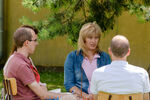Faithfulness is not Laziness
Since the beginning of the war in Ukraine, the leaders of the UMC in Poland, Czechia, Slovakia, Hungary, and Romania have been involved in a variety of ways for refugees from Ukraine - regardless of whether these people are on their way to Western Europe, whether they want to stay in this neighboring country temporarily or long-term, or whether they are trying to return to their homeland.
There are, of course, over and over new challenges, questions, joys and difficulties – however, the general situation in the countries directly or indirectly bordering to Ukraine is rather stable. This results in the reality that it is not possible to share new developments, ministries, and visions in a weekly or bi-weekly rhythm. But the coordinators for the ministries with/for Ukrainian refugees in these countries emphasize that this does not at all mean that the activities with/for their "guests" would have ceased. To the contrary; the church leaders and many volunteers continue to faithfully be a blessing for Ukrainian "guests" in their respective countries, but also for internally displaced persons in Ukraine itself. The current activities include:
• offering short-term and long-term accommodation
• providing people with meals
• supporting people in their educational needs and helping them in finding jobs
• taking care of the children while the mothers are working
• partnering with people who had small businesses in Ukraine and want to transfer them to their new
• home country
• offering pastoral care
• helping people in regard to their onward journey either to Western Europe or back home
• organizing and/or supporting regular humanitarian aid transports to Ukraine (non-perishable food, hygienic articles, medicines, medical equipment, etc.)
In addition to these ministries, the "regular" activities of the communities, which had existed for many years already when the war in Ukraine started, continue - for example, group activities for women, youth and children. Or programs with and for people of the ethnic minority of the Roma. Or the many-sided diaconal programs for the poor and the needy. And now in the summer, of course, especially the summer camps of various kinds.
Again and again, it becomes apparent that being on the road with Ukrainian "guests" on the one hand and being involved in other ministries on the other hand are not two completely separate branches of work, but that they occasionally merge with each other. For example, when joint worship services are celebrated. Or when a three-day national summer camp takes place in Romania where the participants learn together about trust – and where 30 of these participants are "guests" from Ukraine. Or when the biennial national family camp is held in Hungary and 10 of its participants are also from Ukraine.
Where humanitarian aid and spiritual activities go hand in hand and the church is on a journey with the people in a holistic way, it accepts the challenge of truly being the church.
Source: Urs Schweizer, Assistant to Bishop Patrick Streiff, Zurich

